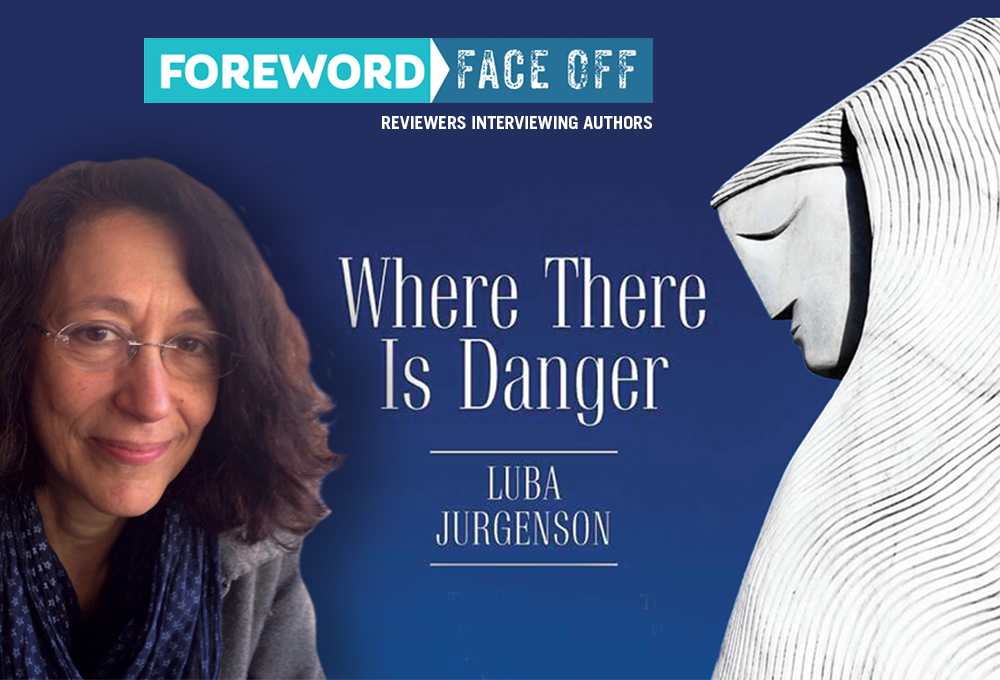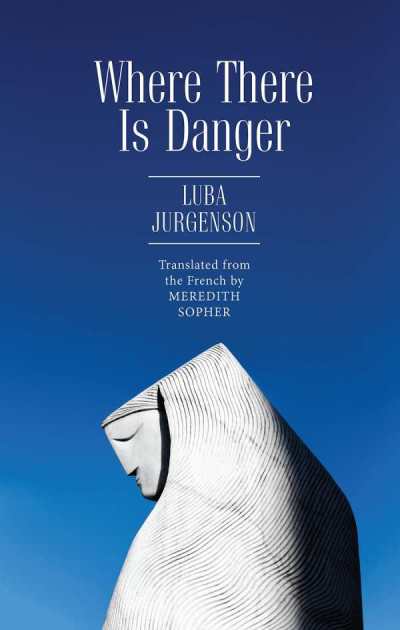Reviewer Camille-Yvette Welsch Interviews Luba Jurgenson, Author of Where There Is Danger

The ability, the skill, the gift of speaking two or more languages is astounding to many of us with only one tongue rattling around in our heads. What’s it like to have a whole new vocabulary to describe the world, when every object now has two names and every thought is infused with additional nuance?
Yes, bilingualism is magic, but it also must be confusing while jumping back and forth between languages. Sorting through all those extra words, keeping track of who you’re speaking to and which language is required sounds mindboggling—especially after a glass of wine.
So, if you’re one of those exotic creatures with more than one language at your disposal, we stand in admiration.

This week, we’re joined by Luba Jurgenson, a writer who left the Soviet Union at the age of seventeen for France. Currently a professor of Russian literature, Luba has long been intrigued by how the Russian and French languages contribute to her sense of self, and in her new collection of essays, Where There Is Danger, she puts her extraordinary background and intellect to work seeking to “understand the strange reality of being a citizen of two languages and their cultures,” according to Camille-Yvette Welsch in her review for Foreword’s November/December issue.
A first-rate wordsmith herself, Camille-Yvette jumped at the chance to engage with Luba, so we worked with Academic Studies Press to set up this interview.
Ladies, take it from here.
You have a unique interior space made up of two languages, and you swim between them. Is that space isolating or liberating, and how does it relate to your ability to work?
For me, the transition to French was initially liberating, even if it imposed a great constraint on my writing. Liberating because it freed me from the great weight of Russian culture, which could prevent me from writing. I was somehow entering a space where no one had worked before me, the space of an in-between. Bilingual writing has also freed me from the influences that can be heavy when you start writing. I can “invite” other writers into my texts: it is not perceived like influences, it’s a dialogue.
Today, the back and forth between languages has become a form of writing, I translate my own texts in one direction and in the other, it gives associations and unexpected sounds. It also frees me from the fear of exhaustion, a fear that accompanies any writer. Each book is a new beginning; I reproduce in each book the gesture of changing language. It’s difficult, but it protects me from fatigue.
When seeing your mind, your text, translated into English, how does this add to your thoughts on the nature of bilingual identity and your place within it?
Once you have “abandoned” your native language, you can easily imagine yourself changing tongue again. The reasons for changing language are partly contingent. Of course, I was—and I am—very attached to the French language, but if I had emigrated to a country other than France, I would probably have written in another language.
The United States was a possible destination for Jewish emigrants from the USSR. Every time I am in America, I tell myself that in another life, I would have dwelt there and written in English. For me, English is therefore the kingdom of virtuality, a life in the conditional tense.
In his tale “The Other,” Borges, sitting on a bench in Cambridge, meets the young Borges who lives in Geneva. Seeing my text translated into English, I meet a Luba who would have lived in the United States. A possible identity, which has not been realized or which has been realized thanks to the work of Meredith Sopher. I often wonder what I would have written in a language other than French. Of course, this question cannot be answered, because I would probably have been another person. So, seeing my text in English translation is similar to looking behind the mirror. I feel a little like Alice.
You often use nature metaphors in your writing. How does the natural world help you pass meaning across languages?
I didn’t realize it. But now that you put this question, I witness it. Nature is a universal language. At least that’s the impression we have. Of course, each culture has its own vision of nature. A German lime tree is different from the Russian lime tree, because, for example, of the Schubert song based on the poem of Wilhelm Müller and included in his Winterreise. But the Russians also listen to this song and so, lime tree crosses borders.
Finally, the rose is everywhere the rose, in Gérard de Nerval’s works as well as in Alexander Blok’s ones. The swallow flies in Mallarmé’s and Mandelstam’s poems and becomes an image of the word as such (“I forgot the word I wanted to say/The blind swallow flies back to her hall of shadows…” Translation Kevin Kinsella). So, paradoxically, the natural world helps to create representations of language, of words, while itself is mute, or, maybe, precisely for this reason.
Nature provides in some ways the illusion of being before the language: I am capable of looking at a flower without naming it, just standing in the space between things and their names.
Nature is a permanent metamorphosis: it grows, hatches, matures, fades. As does language. Words are born, develop. and die. All the time, new words and new expressions appear. Familiar expressions change their meaning. It is a fascinating process. Some words have a very short life, their evolution is similar to that of butterflies. Others are like mountains that grow and degrade very slowly.
Language is a living organism, I put myself in the shoes of a naturalist who would observe his life and try to understand it.
Water is a frequent metaphor when you are talking about translation. Why does that feel so apt for you?
Perhaps because water can constantly change shape while keeping a physical body clearly visible, because it is transparent but can also reflect, because it flows and streams, branches, or is agitated by waves. Water is the eye of the landscape. I like the idea that a river can cross borders, such as the Danube, for example, or the Rhine. And then I lived for sixteen years in a city where the metamorphoses of water into ice, snow, and vice versa were observed. It gives you an imagination.
You suggest in “Forgetting Babel” that you can “pass” as native in French and largely in Russian. You also study representations of mass violence. Bilinguals have the unique ability, if they can lose their accents, to move between cultures. Historically have these two things interacted? Is bilingualism a kind of protection, making one a chameleon?
This is a very important issue. Indeed, by studying the literature on the camps, we learn that knowing a language can be vital. For example, knowledge of German in a Nazi concentration camp was a survival factor. On the other hand, sometimes one had to hide his knowledge of a language (Yiddish, for example). In the USSR, during the Stalinist era, people who knew foreign languages sometimes had to conceal it, because it was a dangerous knowledge.
Of course, I have not experienced these dramatic situations. But there is family memory and also historical memory. I was taught French so that I could escape from a country that was closed. It was then a pure dream, but I knew very early on that knowing a language could give you a chance to escape fate.
A language can be used as a hideout. I can say things in French that I couldn’t say in my mother tongue. Bilingualism increases the space for privacy, and also gives the possibility to play hide and seek with the reader.
You raise the idea of plenty in the French language and austerity in Russian. In what other ways do you see culture shape the languages? How has technology and its vocabulary reshaped the languages? What do you see being lost? Being gained?
In reality, Russian is more flexible, it is easy to form new words, to mix different temporalities. But I became a writer in French, I have internalized the constraint, I see it as a source of inspiration. I don’t know if culture shapes languages or the reverse. Maybe it’s fair to say that it’s a two-way process. Language, at a given moment, is the result of everything that is written, thought, and exchanged within it. But this complex dynamic is not conceivable without taking into account the whole culture. Languages and cultures are made up of exchanges, movements; they are hybrid.
I know little about technological language, only to the extent that it invades our daily lives. It remains a little exotic for me, in all languages. But I have to notice its great expressiveness and a certain beauty. Certainly, there are words I don’t like, like clicking or blogging. But many words come from the book culture, even philosophical or religious, as icons; from biblical culture, if only the apple bitten off the lid of the Mac.
Every time you use the Word format, you remember that “in the beginning was the Word.” Thanks to the Internet, the Word has regained its capital letter. For this fundamentally new virtual world, rather classical representations have often been used. In administrative language, for example, we say “create an agent.” This means that you enter someone’s personal data into a software program. In this way, every public servant can feel in God’s place.
There is a theological dimension to the Internet. We are also talking about dematerialization, so it is an immaterial world like that of angels. It is an extraordinary phenomenon. Of course, he models the imaginary. The technique has a great impact on the language, because it invents new gestures and therefore, allows new images, new metaphors.
At any moment, something is lost, something is gained. Certainly, today this process is moving so fast that we sometimes do not have time to appropriate these new language items, not time to gain, only time to lose. I don’t think about it too much, I tell myself that if I move at my own pace, my time won’t go beyond me, it’s like the story of Achilles and the turtle. After all, who could predict the success of words like browser or capture?
“A bilingual person cannot be seen in entirety by others.” Is there any medium in which that entirety might be seen?
Of course, nobody can by seen in entirety. Every person has his hidden part. But I meant that a bilingual person possesses a sort of “astral body” in another language, and this body is invisible when we speak. Our interlocutor can only imagine how we are in our other hypostasis. A part of us is inaccessible to them.
I feel like I have two faces, two bodies, one in each language. Maybe it’s because language is not only a communication tool for me, but also a place for self-realization through writing. Maybe if I had chosen music or painting as my mode of expression, I wouldn’t have had that impression. I started by painting, but in the end literature drove it out. Probably dancing makes it possible to be whole.
Camille-Yvette Welsch
